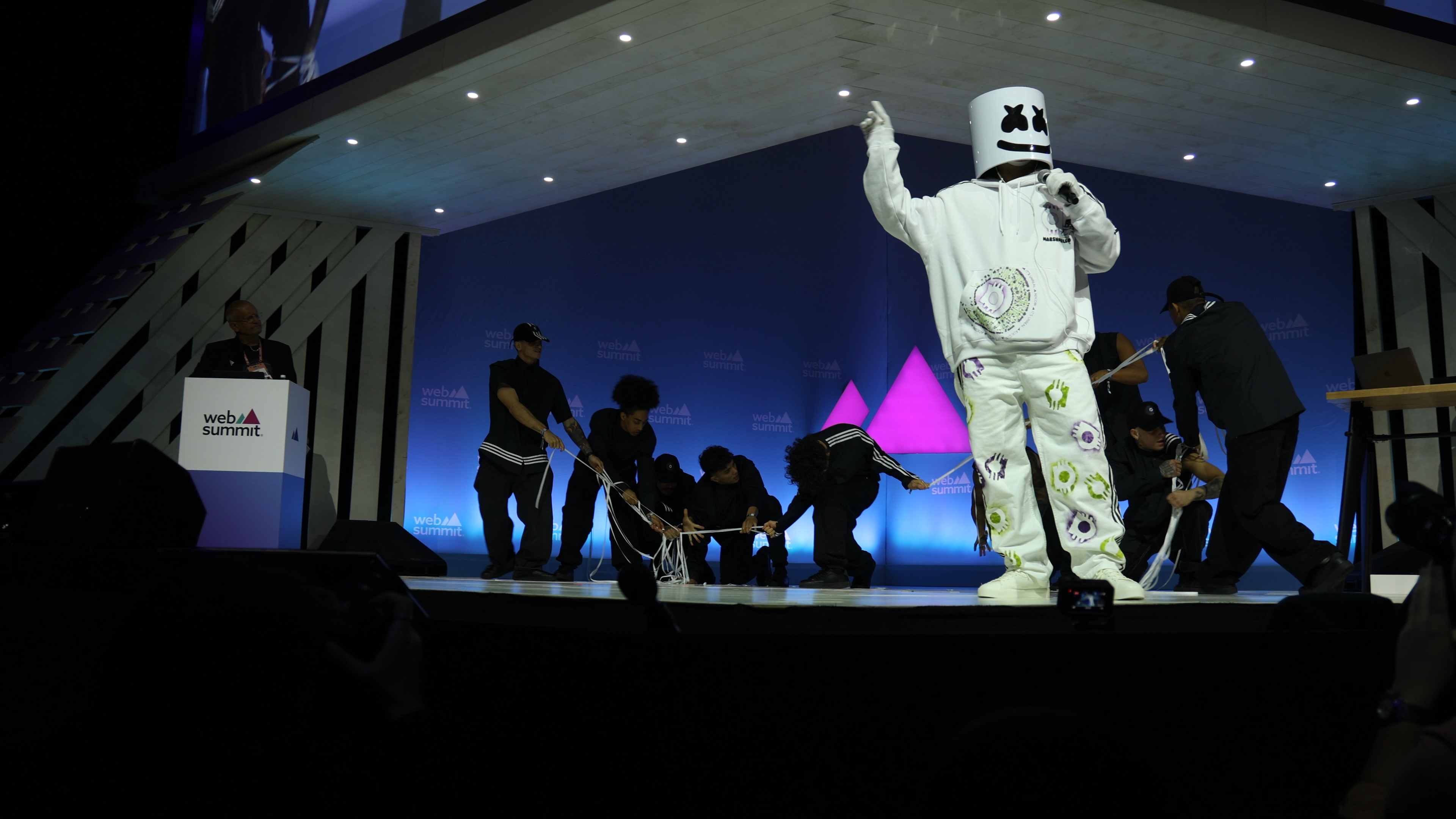
Looking back: Why no one batted an eye during the Yes Men’s outrageous “adiVerse” presentation
After last week’s Yes Men action impersonating adidas at the Web Summit conference, it is time to take stock and ask the question: how is it possible that this terrifying vision of how international companies ignore basic worker rights in their supply chain was not significantly questioned? And the other question that arises is: why does adidas still get away with wage and severance theft?
Today, the Yes Men released a music video with the song that the fake Marshmello launched during the event, summing up what happened during the stunt. This video is part of the extensive overview that the activist collective has created on its website.
“We expected our outrageous presentation, which featured the appearance of multiplatinum DJ Marshmello and a troupe of fantastic breakdancers, to end in some sort of chaos. We even planned ways to get everyone out. And yet no one in the thousand-strong audience objected to the talk,” write the Yes Man in a “behind the scenes” summary: “Even when "adidas rep" Aristide Feldholt amped it up even further at the press conference, no journalist asked any hard questions. One even called it "revolutionary."”
The hoax, which was initially meant to break the same day, as people would start asking questions about the outrageous idea that workers would be paid in crypto currency only usable in adidas’ own nightmarish digital environment, lasted for over 30 hours. Only as the Yes Men revealed the prank on Thursday evening 16 November did journalists start reaching out to adidas for a comment.
In a response to Fashion United adidas stated that during the pandemic they “ensured compliance with legal requirements regarding income and social benefits and documented the working conditions in each individual factory.”
Adidas’ comments gloss over the fact that many governments in garment producing countries temporarily lowered minimum wages in response to brands’ order cancellations and subsequent failure to take responsibility for their workers. In Cambodia, for example, where garment worker unions calculated that workers making product for adidas lost out on at least 11.7 million USD, garment factories only had to pay 40% of the minimum wage. Workers additionally received 20% from the government, meaning that they ended up with just 60% of what was already a poverty wage. Brands like adidas have a responsibility to make workers whole for these losses.
Additionally, adidas responded to the mentioning of the case of the Hulu Garment workers in the wake of the action by saying: “The collaboration between the manufacturer Hulu Garment and one of our licensees was limited in time from the outset and expired as contractually agreed in August 2020. All orders were processed and paid in full. An independent arbitration tribunal and the Fair Labour Association were also unable to find any misconduct”.
The 1,020 workers of the Hulu Garment in Phnom Penh, Cambodia, were suspended in March 2020 at the beginning of the pandemic. On 22 April 2020, the workers were called to the management and told to “sign” a document with their thumb print in order to receive their 40% suspension pay. Hidden under their payslip was a line stating they were resigning, thereby foregoing their right severance pay. When workers found out the next day that they were tricked into resigning, hundreds of workers protested. A month later, the factory reopened but half the workforce was never rehired. Up to this day, 500 workers continue to demand payment of the over US$1 million in severance they would be legally owed if they had been fired and not been scammed into resigning.
Christie Miedema, campaign and outreach coordinator at Clean Clothes Campaign, said: “With its statement that adidas was contractually linked to this factory until August 2020, it is clear that adidas carries responsibility under the UN Guiding Principles for Business and Human Rights to remedy this case. Adidas should not hide behind a ruling of the Cambodian arbitration council, which was exposed by Human Rights Watch as “politically compromised” to the detriment of the workers, nor behind the industry-dominated Fair Labor Association.”
Adidas’ response does not even acknowledge other cases brought up in the Yes Men presentation, such as the severance theft in the Victory Chingluh factory in Indonesia or the structural payment of wages below the legal minimum in the Meng Da factory Cambodia.
Adidas could solve all of these issues in one go by signing the Pay Your Workers agreement: unions and labour rights organisations have been calling on adidas continuously for over 1.5 years to do so, but the company refuses to come to the negotiating table.